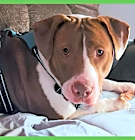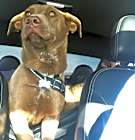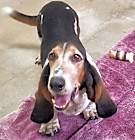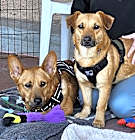Color
Red/Golden/Orange/Chestnut - with White
Size
(when grown) Med. 26-60 lbs (12-27 kg)
Details
Good with kids
Good with dogs
Not good with cats
House-trained
Spayed or Neutered
Shots are up-to-date
Story
Meet Sully!
The charming Basset Hound/Pitbull Mix from Boulder Creek, CA. At two-year-old, Sully is a bundle of exuberance and affection, making him an absolute delight to have around. With his endearing floppy ears and perpetually wagging tail, he's sure to steal your heart from the moment you meet him!
Sully is the epitome of a playful pup, always ready for an adventure or a game of fetch in the great outdoors. His boundless energy knows no bounds, and he thrives on the opportunity to stretch his legs in a spacious fenced-in yard. Whether chasing after his favorite toys or simply frolicking in the sunshine, Sully is happiest when he's on the move!
Despite his playful nature, Sully is also a constant companion, sticking by your side through thick and thin. He craves human affection and thrives on being a part of the family dynamic. Whether you're lounging on the couch or out for a hike.
In addition to his affectionate nature, Sully is a remarkably intelligent pup with the potential to excel as a working dog. With the right training and guidance, he could easily channel his abundant energy into various tasks or activities. However, it's important to note that Sully is still in need of some basic training to help him reach his full potential.
Sully's affable nature extends beyond just humans – he's also great with other dogs, making him an ideal addition to multi-pet households! His friendly demeanor and gentle disposition ensure harmonious interactions with furry companions of all shapes and sizes.
For families with young children, Sully is a dream come true! His patient and tolerant nature make him a fantastic playmate for kids of all ages. Sully is always eager to participate in family fun and bonding activities!
If you're ready to welcome Sully into your heart and home, don't hesitate to reach out to us directly at adopt@joyfulpets.com for more information!

















